
Sulaiman Jassem Sulaiman Ali Abu Ghaith is a Kuwaiti regarded as one of al-Qaeda's spokesmen. He is married to one of Osama bin Laden's daughters. In 2013, Gaith was arrested in Jordan and extradited to the United States. In 2014, he was convicted in a U.S. federal court in New York for "conspiring to kill Americans and providing material support to terrorists" and sentenced to life imprisonment He is serving his sentence at the federal ADX Florence prison in Colorado.

Riduan Isamuddin, also known by the nom de guerreHambali, is the former military leader of the Indonesian terrorist organization Jemaah Islamiyah (JI). He is currently in American custody at Guantanamo Bay detainment camp in Cuba. He is currently awaiting trial in a military commission.

Ibrahim Ahmed Mahmoud al Qosi is a Sudanese militant and paymaster for al-Qaeda. Qosi was held from January 2002 in extrajudicial detention in the United States Guantanamo Bay detainment camps, in Cuba. His Guantanamo Internment Serial Number is 54.
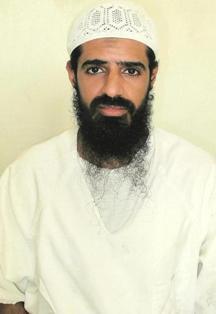
Walid Muhammad Salih bin Mubarak bin Attash is a Yemeni prisoner held at the United States' Guantanamo Bay detention camp under terrorism-related charges and is suspected of playing a key role in the early stages of the 9/11 attacks. The Office of the Director of National Intelligence has described him as a "scion of a terrorist family". American prosecutors at the Guantanamo military commissions allege that he helped in the preparation of the 1998 East Africa Embassy bombings and the USS Cole bombing and acted as a bodyguard to Osama bin Laden, gaining himself the reputation of an "errand boy". He is formally charged with selecting and helping to train several of the hijackers of the September 11 attacks. On 31 July 2024, Attash agreed to plead guilty to avoid the death penalty. His plea deal was revoked by Secretary of Defense Lloyd Austin two days later.
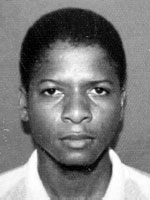
Ahmed Khalfan Ghailani is a Tanzanian conspirator of the al-Qaeda terrorist organization convicted for his role in the bombing of embassies in Kenya and Tanzania. He was indicted in the United States as a participant in the 1998 U.S. embassy bombings. He was on the FBI Most Wanted Terrorists list from its inception in October 2001. In 2004, he was captured and detained by Pakistani forces in a joint operation with the United States, and was held until June 9, 2009, at Guantanamo Bay detention camp; one of 14 Guantanamo detainees who had previously been held at secret locations abroad. According to The Washington Post, Ghailani told military officers he is contrite and claimed to be an exploited victim of al-Qaeda operatives.

Mohammed Mani Ahmad al-Qahtani is a Saudi citizen who was detained as an al-Qaeda operative for 20 years in the United States's Guantanamo Bay detention camps in Cuba. Qahtani allegedly tried to enter the United States to take part in the September 11 attacks as the 20th hijacker and was due to be onboard United Airlines Flight 93 along with the four other hijackers. He was refused entry due to suspicions that he was trying to illegally immigrate. He was later captured in Afghanistan in the Battle of Tora Bora in December 2001.
The Al Farouq training camp, also called Jihad Wel al-Farouq, was a Taliban and Al-Qaeda training camp near Kandahar, Afghanistan. Camp attendees received small-arms training, map-reading, orientation, explosives training, and other training. Nasir al-Bahri reported that the camp was only established following the arrival of Egyptian Islamic Jihad and Egyptian Islamic Group militants who had suitable expertise as to provide training to others.

The Darunta training camp(also transliterated as Derunta) was one of the most well-known of many military training camps that have been alleged to have been affiliated with al Qaeda.
Samir Naji al Hasan Moqbel is a citizen of Yemen who was held in extrajudicial detention in the United States's Guantanamo Bay detention camps, in Cuba. His Guantanamo Internee Security Number was 043. The Department of Defense reports Moqbel was born on December 1, 1977, in Taiz, Yemen.
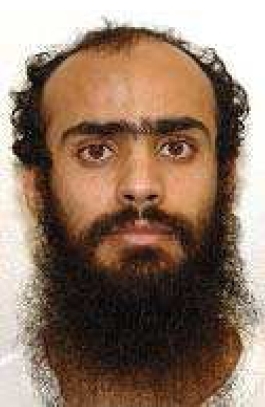
Ali Ahmad Muhammad Al Rahizi is a citizen of Yemen who was held in extrajudicial detention in the United States Guantanamo Bay detainment camps, in Cuba. His Guantanamo Internment Serial Number is 45. Joint Task Force Guantanamo counter-terrorism analysts reports he was born on October 13, 1979, in Taiz, Yemen.
Abdullah Tabarak Ahmad is a citizen of Morocco, who was held in extrajudicial detention in the United States Guantanamo Bay detainment camps, in Cuba.
American counter-terrorism analysts justified the continued extrajudicial detention of many Guantanamo captives because they were suspected of staying in al-Qaeda safe houses, or guest houses—or because names matching theirs, or their "known alias" were found in the suspect houses.

Moath Hamza Ahmed al-Alwi is a citizen of Yemen, held in extrajudicial detention in the United States Guantanamo Bay detainment camps, in Cuba. His detainee ID number is 28. Guantanamo analysts estimated he was born in 1977, in Al Hudaydah, Yemen.

Idris Ahmed ʽAbd al Qader Idris is a citizen of Yemen, who was held in the United States Guantanamo Bay detainment camps, in Cuba. His detainee ID number was 035. American intelligence analysts estimate he was born in 1979, in Rada, Yemen. Idris was transferred to Oman on June 13, 2015, where the Government of Oman agreed to what the Department of Defense called "appropriate security measures". He arrived on June 8, 2002, he was held in extrajudicial detention, and never faced criminal charges. The Department of Defense never fully released its justification for holding Idris, but on April 25, 2011, the Guantanamo Bay files leak was published.
The American intelligence analysts who compiled the justifications for continuing to detain the captives taken in the "war on terror" made dozens of references to al Qaida safe houses, in Karachi, Pakistan.

Sharqawi Abdu Ali al-Hajj, also known as Riyadh the Facilitator, is a Yemeni alleged Al-Qaeda associate who is currently being held in the United States' Guantanamo Bay detention camps, in Cuba. He is accused of being a "senior al-Qaida facilitator who swore an oath of allegiance to and personally recruited bodyguards for Osama Bin Laden".

Ayman Saeed Abdullah Batarfi is a Yemeni doctor who was held in extrajudicial detention in the United States Guantanamo Bay detention camps, in Cuba. His Guantanamo Internment Serial Number was 627.
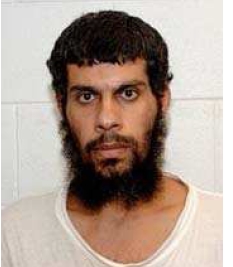
Mohammed Rajab Sadiq Abu Ghanim was held in extrajudicial detention in the United States Guantanamo Bay detention camps, in Cuba, for almost fifteen years. His Guantanamo Internee Security Number is 44. He was eventually transferred to Saudi Arabia
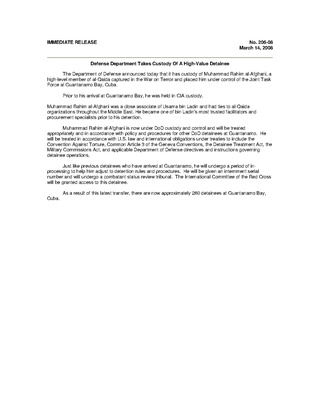
Muhammad Rahim is an Afghan national who is held in captivity by the United States Government at Guantanamo Bay. He was born in eastern Afghanistan. Muhammad Rahim worked for an Afghan government committee that worked to eliminate opium poppies from the nation. He was forced to leave his job by the Taliban. In 1979, Rahim fled Afghanistan with his brother over the border of Pakistan. Their departure was triggered by the Soviet Union invasion into Afghanistan.
A group of prisoners at the Guantanamo Bay detention camp, the Dirty Thirty were believed to be the "best potential sources of information" and consequently the chief focus of the harshest methods of interrogation. Many of these captives were alleged to be Osama bin Laden bodyguards, or associates of Osama bin Laden.














